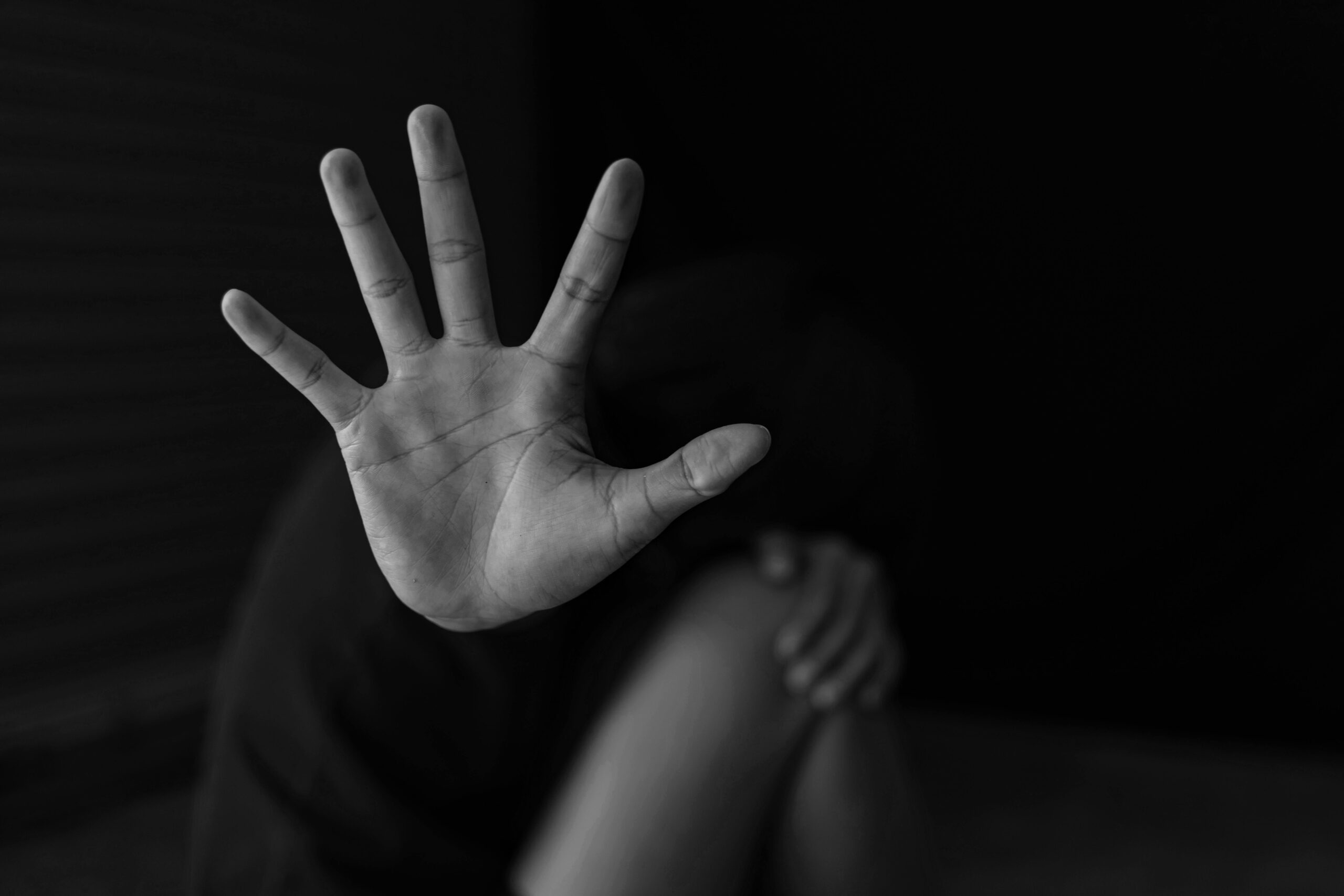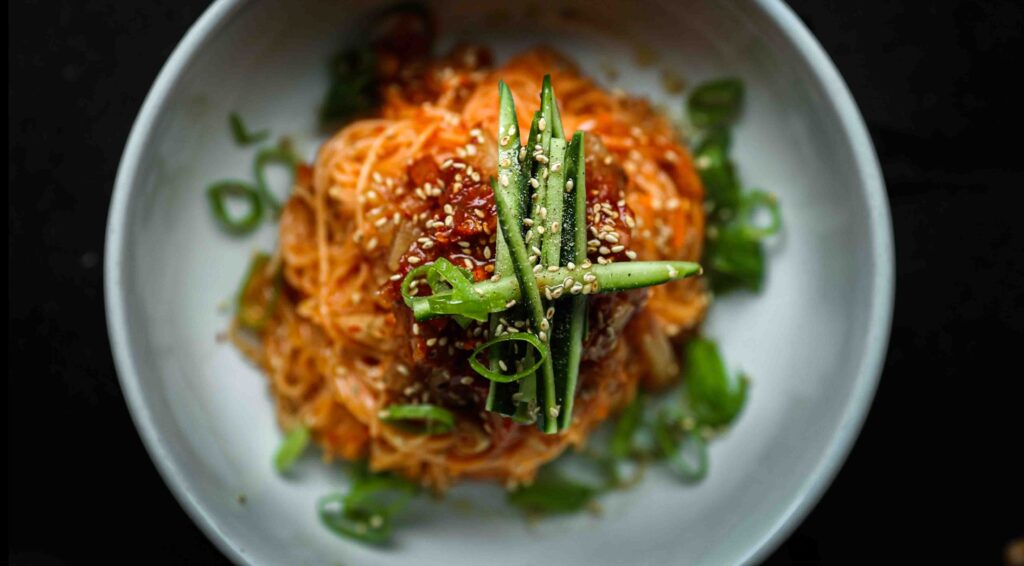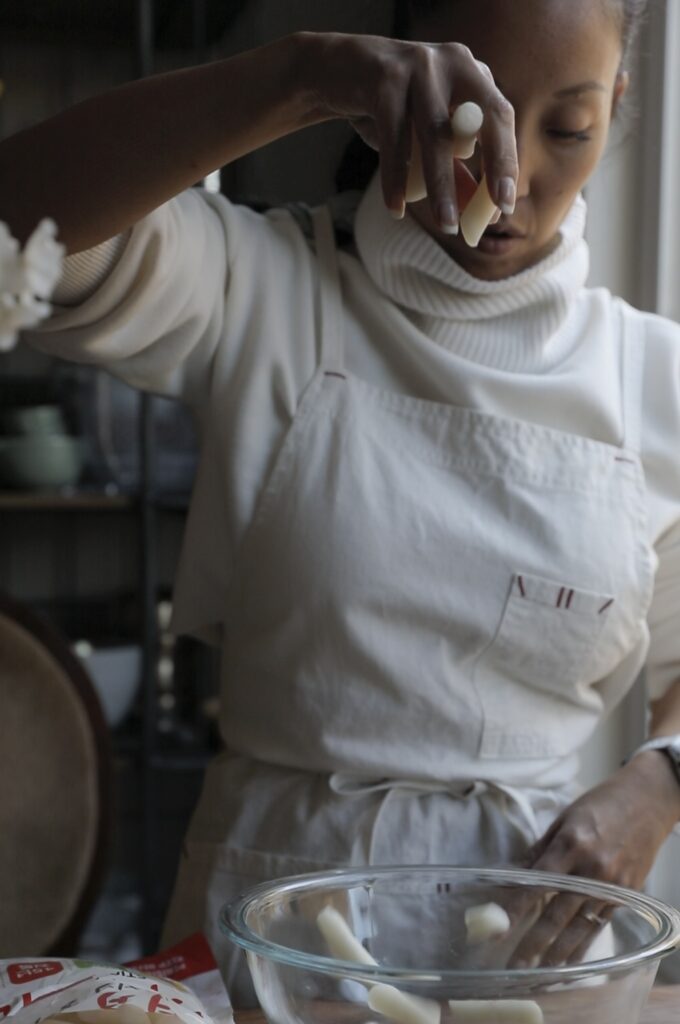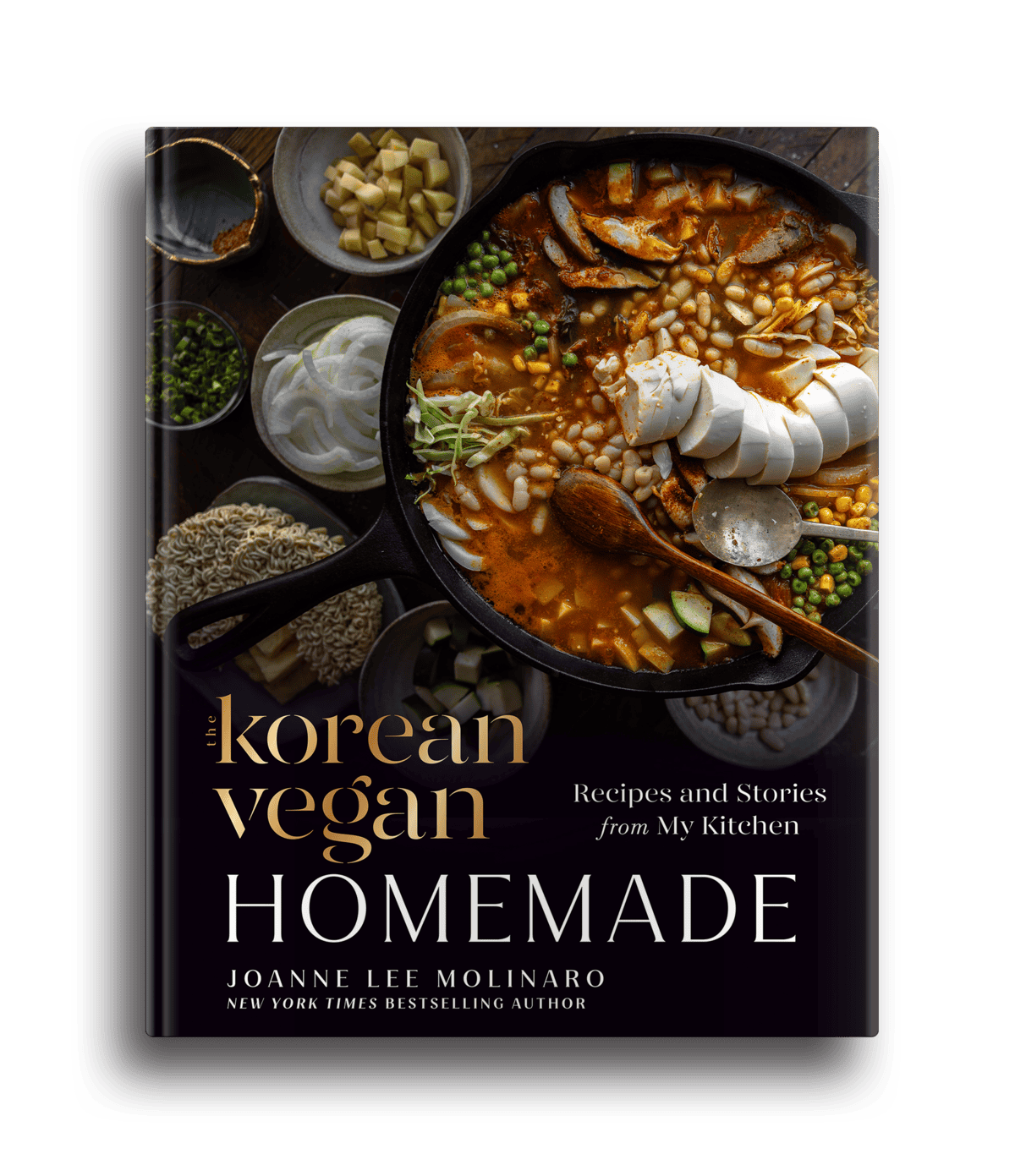P. Diddy, The Bear, and Cold Kimchi Noodles.

I was getting my nails done when I saw an email pop into my inbox. It was a newsletter by Yashar Ali, with the subject reading: “BREAKING: Sean ‘Diddy’ Combs Caught Beating His Then Girlfriend On Camera.” I clicked on it, began watching the silent video published earlier that day by CNN, and then quickly turned my head away as both my hands were captive to my nail technician.
If you haven’t already seen it, the video is violent and stomach curdling. In it, you can see P. Diddy violently assaulting his then girlfriend, Cassie Ventura, in the elevator lobby of a hotel.
I began noticing a surprisingly low tolerance for watching violence against women a few years ago, when the Netflix hit “Maid” was making all the rounds on social media. I got through about half the first episode before I turned to Anthony and said, “I don’t want to watch this anymore.” I’d begun sweating uncomfortably and feeling a little nauseated, which I found to be odd. I’d never felt such unshakeable physical sensations in response to a fictional TV show or movie, despite watching all of Saving Private Ryan, Braveheart, and Game of Thrones.
Intellectually, I surmised it was my body’s reaction to the proximity of the violence I was witnessing, albeit in a fictional setting. On some level, my brain recognized that my body was similar to the body that was being harmed on screen, and therefore, answered with hints of the same “fight or flight” reaction that kept the female body (and the rest of our species) alive. But, this had to be only half the answer, right? I’d never been struck with such crippling nausea while watching a woman get into a car accident, suffer a fatal injury, or die on the battlefield. No.
There was something viscerally and specifically disturbing about watching a woman get attacked by a man.
Bear v. Man Dust-Up.
The timing of P.Diddy’s literal and metaphorical disrobing was notable: the internet was still warring over the “Bear v. Man” debate (and no, “Bear” does not refer to the amazing Netflix show about a down-on-his-luck and likely depressed Michelin rated Chicago native chef) and netizens were quick to slap exhibit stickers on the Diddy video as evidence in favor of Team Bear.
A quick recap in case you’ve missed the “Bear v. Man” matchup:
We’re not talking about who would win in a gladiator-esque fight to the death between a man and a bear. Rather, the question being asked by the internet (mostly women) is this:
Would you rather be alone in the woods with a bear or a man you didn’t know?
For men, perhaps the answer is obvious. So, let’s put it another way:
Would you rather your young daughter be alone in the woods with a bear or a man she didn’t know?
In both cases, even I would be hard-pressed to select the “bear” (though many women have claimed they would); but, that isn’t really the point. It’s the pause, the really long and revealing pause (hmmmmmmmm…….) one has to take to ultimately conclude, “Ok, yeah…. I’ll take my chances with a man over a bear in the woods.”
Now, compare those few seconds (or even minutes) with the amount of time to answer:
Would you rather your young daughter be alone in the woods with a bear or a woman she didn’t know?
Baked into that pause is an infinite amount of conditioning women begin to receive at birth, conditioning that teaches them that their bodies are never safe and that their #1 predators are none other than their fellow human:
Men.
“Not All Men.”
And, as if on cue, a [largely male] chorus begins singing the following refrain:
Not all men.
I did a little research on domestic violence and found the following estimates to be eye-opening:
- 1 in 4 women will be subjected to severe physical violence by their intimate partner. (NCADV.org.)
- 1 in 4 women will be victims of completed or attempted rape in their lifetime. (CDC.gov.)
- 1 in 4 men will use violence against his intimate partner. (See TrueselfHealingGroup.com.)
- 3 out of every 4 domestic homicide victims are women, with the overwhelming majority of the suspects in those homicides being men. (See WomensAid.org.uk.)
- Less than 1 out of 10 claims of sexual or physical violence are proven false. (See SouthBendTribune.com: “Validated studies show that false reporting in domestic violence cases and rape cases is between 2 percent and 6 percent.”)
Yes, it is absolutely true that the majority of men will not contribute to any of the above statistics. But “1 in 4” is the kind of thing you don’t want to hear when discussing the likelihood of sustaining really bad roof damage, getting diagnosed with cancer, or, dare I say it, encountering a bear in the woods.
Implicit in the “not all men” rebuttal is the notion that somehow, we should be able to easily pick out the defective ones, as if the “1 in 4 men” who will beat or rape all come with an easily identifiable tag clipped to the nape of their necks or a visible sign draped over their bodies saying “BAD NEWS.” But of course, that’s not the case at all. Attackers come in all shapes and sizes, all races and ethnicities, and from across the full socioeconomic spectrum.
In fact, if the stats above are even close to accurate, women are either abysmally stupid (e.g., they go out of their way to pick a fight with a bear) or eluding these men is a lot more difficult than one might guess. This is particularly true when women are at a disadvantage in every way that matters when it comes to protecting themselves and their bodies, as evidenced by the fact that P.Diddy allegedly paid the hotel $50,000 to keep them quiet about the footage that recorded his violence; that he was able to use his enormous wealth to buy the silence of that hotel (allegedly) and even his victim; that, less than 2% of domestic violence offenders get jail time. Women have less money, less access, less representation, less agency and thus the phrase “not all men” rings rather hollow when we are literally at the mercy of so many men.
Given that I am more likely to become the victim of severe physical violence or rape than I am to be diagnosed with breast cancer, I suppose I should consider myself lucky that I am, to this point, neither of those things.
But I’ve come close enough.
When I was 9 years old while waiting for my mother to return from looking at something at a convenience store, a man I didn’t know standing next to me grabbed a part of my body and twisted it, painfully–a part of my body that only my physician had previously touched. He did it again, while smirking at me, and inside, I knew it was wrong and gross and horrible, but at the same time, he was a man and thus effortlessly bore the patina of authority, not just because the world gave it to him, but because I knew he could, at any moment, do so much worse. Before he reached for my chest a third time, my mother grabbed me and pulled me away, yelling the equivalent of “WHAT THE F*** IS WRONG WITH YOU SICKO” in Korean at the perpetrator before hustling me out of the store.
Omma, too, was nearly the victim of sexual assault. She told me, a long time ago, that once, back when she was still studying for the nursing Boards here in the US, while she was taking the subway to work, she noticed a man staring at her and then down at the adult magazine he held on his lap. When she got off the el at her stop, he followed her. She picked up her pace but his pursuit continued, until he got close enough that my mother could hear all the things he promised to do to her when he finally caught up to her. Luckily, she spied the lit entryway to a hospital–not the one she worked at–and took a sharp turn into its double doors, where she was met with nurses and police officers who were on duty that night.
And her stalker disappeared.
But Why Does She Stay?
These were both men we didn’t know. What about the men we choose to bring into our lives, into our homes?
I fell in love with and married my college sweetheart. He loved animals, could draw just about anything I asked him to, loved to sing and play the drums. Once, for Valentine’s Day, he handmade an entire vase of beautiful flowers out of pipe cleaners. He could also make me laugh more than anyone I’d ever met. He had a good heart and I really believe he loved me with that good heart. Unfortunately, a darkness would sweep over him when we fought and the same heart that loved me so much could expel me with ease, until I became his adversary. He confessed to me, once, that when that happened, all he wanted to do was hurt me.
And he did.
Again, I am lucky. Physical altercations were exceedingly rare and I was never seriously injured. The few times it got to that point, he was so horrifically sorry, so remorseful, I felt more sorry for him than I did for myself. People always wonder why women stay. There are a litany of reasons that make it virtually impossible for women to leave. But perhaps the most pernicious one is that we love them. We love them.
We love the men who hurt us.
Maybe that’s why I had to turn my head and look away. Because there’s a good chance that the woman getting beaten within an inch of her life loves the man who’s hurting her. Loves him so much, so hopelessly, she’s completely forgotten what it means to love herself.
Or maybe she never did.
And that’s the thing I cannot stomach.
Do you have thoughts on this week’s newsletter?
Around The Horn
In response to last week’s newsletter, But Should You Even Want to Live Longer:
Bette says:
May 14, 2024 at 10:40 am
“An interesting twist to the longevity discussion is Dr. Ezekiel Emanuel’s 2023 declaration that, after age 75, he will no longer seek or agree to receive any medical interventions intended to prolong his life, including screening and diagnostic tests, chemotherapy, surgeries, etc. As a well-known bioethicist and oncologist, he speaks from a place of firsthand knowledge of how our medical system works with aging bodies.Separately, I like your analogy of the bookends and the books in between, with the caveat that an earthquake can come along and topple all those books to the floor at any moment. There’s an element of what seems like randomness to our lives that we have to acknowledge! Bad things happen to good people, including those who strive to do everything right.“
This Week’s Recipe Inspo.
It’s that time of year–cold noodle time! Newest recipe on the blog: Cold Kimchi Noodles!

What I’m…
- Watching. We are now closing in on the conclusion of Season 3 of This is Us. It is truly amazing that neither my husband nor I watched this show when everyone was talking about it during the pandemic, because it is quickly becoming one of the greatest shows we’ve ever watched! I know that this is repetitive and I typically like to populate this space with new recommendations each week, but I only have time to commit to one show at a time and, well, this is the one! Watch –>
- Reading. Did you know that Craig Alanson used to be an IT professional? That he would write his stories after work or on his days off? And then one day, he took a gamble and self-published on Amazon. AND I AM SO GLAD HE DID!! I’ve written about his series, Expeditionary Force, before and with every installment, I grow ever more certain that this might be the BEST sci-fi series I’ve ever read. I cannot get enough of it!! Order –>
- Loving. Or, what Lulu is loving! Lulu is NOT a picky eater, but, guess what? She’s got a VERY picky feeder!! My husband and I are very discriminating when it comes to the food, supplements, and treats we give our Lulu and we really like these Immunity Treats. They are entirely vegan, wheat free, and made with blueberry puree, nature’s delicious antioxidant! Shop –>
Parting Thoughts.
“But what if… what if I never love anyone the way I loved him?”
I was sitting in my office, twisting my fingers around the phone cord, not bothering to wipe the tears from my face. Instead, I watched them drop into my keyboard, ooze into the cracks and crevices between the keys. I’d called my therapist for an emergency session. It was the one year anniversary of the day I’d left my ex and the life we’d built together… And somehow, there I was, still sobbing into my keyboard, still indisputably in love with the man I’d left.
“I think that’s a good thing, isn’t it Joanne?”
Colette should have been a lawyer. She would have been a good one. She had rosy cheeks, snow white hair, and big blue eyes peering out from behind a pair of wiry spectacles, the kind you can only find inside the faded, suede case sitting atop your grandmother’s vanity. When I first walked into her small office, I thought instantly, “She looks like Mrs. Claus!” But I soon discovered that Colette strategically employed her warmth and empathy and her shocking resemblance to Santa Claus’s wife to mask the scalpel she used to get to the bottom of things.
She also had a talent for delivering a killer closing:
“You don’t want to love another man like you loved him.”
Didn’t I?
I used to believe that all love was good love, that “love is all you need.” And even sitting on the phone with Colette that day, I struggled to feel what she meant, even if I could understand what she meant. Yes, I realize my love–my first love–was toxic and codependent and unhealthy… but wasn’t it still love? And wasn’t it still worth saving?
It wasn’t until I met Anthony that I could definitively say that Colette was right. Maybe it was a good thing that I got that first love out of my system before I met Anthony, because had I not, perhaps I wouldn’t have been ready to love Anthony the way I now do, the way he now needs.
And maybe, I wouldn’t have been ready to accept his love the way I now do, the way I now need.
In closing, I’d like to leave you with something I found quite moving. These words come from Cassie Ventura’s current husband, Alex Fine:
To all the survivors, find the men and women who help and love.
To all the survivors, your stories are real and people believe you.
To all the survivors, you’re not alone, and there are men and women who care only for your well being and safety.
Wishing you all the best,
-Joanne






I was 21, in uni and thought I met my ‘person’. He said all the right things that won my parents over, but alone he would gaslight me, calling me selfish for choosing studies and career aspirations over spending time with him. The last straw was literal kidnapping (across border, at a time when all you needed was a driver’s licence). The physical violence was always implied as a means of control. I left before it came to that, even amid being called ‘crazy’ for leaving such a ‘wonderful’ man, being blamed for the breakup. I left to save myself, so gladly wear the badge of blame.
Emye, thank you so much for sharing this with us. I cannot believe you had to go through this, though the statistics prove that these things happen far to often. I am grateful for your courage and your vulnerability–showing that there is a path if we are brave enough to follow it. <3
I was one of 4 twice. Once in an attempted sexual assault that left me titally shaken. And then as the victim of my ex- husband. It took two assaults that almost killed me and still i didn‘t leave. I was an immigrant with only him as my support (makes me sarcastically and sadly chuckle…because what support is this?) i had no job, no money and most importsntly nobody i felt i could confide in. It took another year and a part time job to finally get me to leave, with literally the clothes on my back.
Like you i cannot watch violence against women. Actually the show „maid“ is my story without the child. I was a waitress, a nurse aide working the 11 pm to 7 am shift and then went to school during the day time. I am and was smart but i believed that the person who loves you should never ever hurt you…well, i was wrong. And like most women i still carry the scars and i still feel ashamed that it happened to me, even though i know better….the stigma is hard to overcome.
Andrea–this comment made me cry. I HATE that your experience is so relatable, and yet I’m grateful that we are not alone. Thank you thank you thank you for your vulnerability, for your bravery, for your strength, and for your solidarity. <3
A pregnant pause. That’s what we call those silences. The pressure of the build up of tension between saying or not saying. The cost of both choices.
There are many good men. Great men. And there are women who commit diabolical acts. (Nothing like the “diabolical acts” suggested in the commencement address. Real ones.) It is safe to say, unfortunately that most of the issues we face are committed by persons with the most power in the dynamic. And the person with the most power is typically the person with the most privileges. Whatever package that comes in.
I recall walking home from school with friends and a car pulled up beside us. The driver, a man, had on no pants and was holding himself.
My father was a police officer and one of his co-workers called the house several times speaking things he wanted to do to me. I was in early elementary.
The message that you’re not safe starts young.
Sadly.
It’s an anxiety your body settles into, a scratchy wool blanket. Uncomfortable, but needed to keep you warm in the blizzards of life.
Thank you for all your messages and recipes. Both feed us, well.
I’m so sorry you went through that with your ex.
There’s an even worse side to intimate partner violence. Pregnant women and new mothers (those with a six week old or younger) are more likely to die from homicide than anything else, and in the majority of those cases the perpetrator is a domestic partner. (It should go without saying that in most cases what they are killed with is a gun.) And pregnant women are uniquely vulnerable: women in the same age range who aren’t pregnant do not die in the same numbers. Oh right: Black women are more likely to be victimized during pregnancy, in no small part because of the way they’re treated by law enforcement and medical professionals. https://www.ncbi.nlm.nih.gov/pmc/articles/PMC9134264/
So maybe the question should be whether you’d want your pregnant daughter alone in the woods with a bear or her intimate partner.